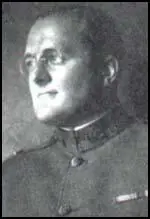Wickliffe Draper

Wickliffe Preston Draper, the son of George A. Draper, a wealthy textile machinery manufacturer, was born in Hopedale on 9th August, 1891. Draper graduated from Harvard University in 1913.
On the outbreak of the First World War Draper joined the British Army. Promoted to the rank of lieutenant he took part in the battles of Neuve-Chapelle, Messines Ridge, Somme and Ypres, where he was seriously wounded.
When the United States declared war on Germany in 1917, Draper transferred to the U.S. Army. He was injured on the Western Front and invalided home to Hopedale, where he gave a talk at the Draper Memorial Church. According to the Milford Daily News (5th December, 1917) Draper “emphasized the prime necessity of absolute discipline in the army, as a requisite of victory, the sort of discipline that keeps the men at the guns, even though it means almost sure death to remain.”
Wickliffe Draper spent the next year as an artillery instructor with the U.S. Army at Forts Sill. In 1919 he left the army with the rank of major. Later he was eventually promoted to lieutenant colonel in the Cavalry Reserve.
When his father, George A. Draper, died in 1923, he inherited the family’s wealth. Draper moved to England where he studied archaeology and anthropology at the University of London. In 1927 Draper funded the team that discovered Asselar Man, the oldest known skeleton from Africa. The following year his achievements were acknowledged in Britain by being elected a Fellow of the Royal Geographical Society.
Draper took a keen interest in eugenics. A very wealthy man, Draper made considerable donations to the American Eugenics Society (AES). In August 1935, Draper traveled to Berlin to attend the International Congress for the Scientific Investigation of Population Problems hosted by Nazi Germany and chaired by Wilhelm Frick, the German Minister of the Interior.
In 1937, Draper founded the Pioneer Fund "to advance the scientific study of heredity and human differences." However, Draper told a geneticist that he "wished to prove simply that Negroes were inferior." The Pioneer Fund was headed by the eugenicist, Harry H. Laughlin, an advocate for restrictive immigration laws and national programs of compulsory sterilization of the mentally ill and mentally retarded. He was also the director of the Eugenics Record Office (ERO) and was among the most active individuals in influencing American eugenics policy, especially compulsory sterilization legislation.
Draper and Laughlin proposed a research agenda to assist in the enforcement of Southern "race integrity laws" by developing techniques for identifying the "pass-for-white" person who might "successfully hide all of his black blood". Laughlin was also highly critical of Jews who he described as "slow to assimilate" and praised the Nuremberg Laws, arguing that the United States and the Third Reich shared "a common understanding of ... the practical application" of eugenic principles to "racial endowments and... racial health." The Pioneer Fund distributed two films from Nazi Germany depicting the eugenic programs in that country.
Draper also developed a close friendship with Earnest Sevier Cox, who argued that the only permanent solution to America's racial problems was complete and total separation of black and white. Cox also advocated the resettlement of African Americans to Liberia. In 1938 Draper published Cox's book, White America. A personal copy was sent by Draper to Wilhelm Frick.
On the outbreak of the Second World War Draper moved to London where he joined British military intelligence and was later transferred to the British headquarters in India.
After the war, he returned to eugenicist and segregationist activism. Draper was outraged by the Supreme Court's 1954 decision, Brown v. Board of Education. It later emerged that Draper secretly sent $255,000 to the Mississippi State Sovereignty Commission to support racial segregation and anti-civil rights violence and intimidation.
John Bevilaqua has argued that Draper might have been involved with James Angleton, Charles Willoughby, Gerald L. K. Smith, Ray S. Cline, Robert J. Morris and Anastase Vonsiatsky in the assassination of John F. Kennedy.
Draper also donated considerable funds to right-wing political organizations such as the World Anti-Communist League (WACL). Established in 1966 by the intelligence organizations of Taiwan and South Korea to provide anti-communist propaganda. Fascists played an important role in the WACL and at least three European chapters of the organization were controlled by former SS officers from Nazi Germany. Members included John K. Singlaub and Ray S. Cline.
Wickliffe Draper died from prostate cancer in 1972. He left $1.4 million to the Pioneer Fund.
